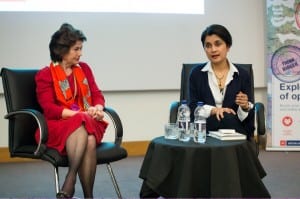UCL Global Citizenship Lecture 2015: Shami Chakrabarti on Liberty
By Kilian Thayaparan, on 26 February 2015

Shami Chakrabarti speaking at the UCL Global
Citizenship Lecture 2015 (Credit: Kirsten Holst)
Shami Chakrabarti’s now infamous description in The Sun as “the most dangerous woman in Britain” was referenced several times during this year’s UCL Global Citizenship Lecture, first by Dame Nicola Brewer, Vice-Provost (International), who described it as “quite an accolade”, and then by Chakrabarti herself, calling it “the gift that keeps on giving”.
Such an extreme epithet set the scene for an intriguing hour of discussion about civil liberties and how global citizenship can make a positive difference to the world.
The lecture comes at an important time in UCL’s Global Citizenship activities with the recent opening of registrations for the UCL Global Citizenship Programme – a two-week programme available to all undergraduates.
It allows students to engage with the world as ‘global citizens’, becoming not only experts in their fields, but also people who are understanding of, responsible for and engaged with the global community.
As Director of Liberty, a non-governmental organisation that campaigns for civil liberties and human rights in the UK, Shami Chakrabarti is, as Dame Nicola Brewer described, “a brilliant advocate for getting involved and making a positive difference to the world” – and, therefore, an ideal figure to inspire others to think about global citizenship.
Chakrabarti began her talk by discussing, in detail, the aforementioned tag as “the most dangerous woman in Britain” (which she noted might have the full audience “quaking in their boots”). The description came from Jon Gaunt, a columnist who regularly appeared on sports radio station talkSPORT.
During one such appearance, and following his political ‘attack’ on Chakrabarti, Gaunt, in a heated debate on smokers fostering children, referred to a Conservative politician as a “Nazi”. He was consequently fired from his ‘shock-jock’ role and would later receive interventional support from – you guessed it – Liberty, describing human rights as “for normal blokes like me”.
Chakrabarti used the story to illustrate her journey and what she’s observed in terms of people’s attitudes to human rights: “Everybody loves human rights – their own. It’s when it gets to other people’s human rights that things become difficult.”

Dame Nicola Brewer and Shami Chakrabarti during
Q&A session (Credit: Kirsten Holst)
After speaking briefly about the foundation of Liberty in 1934 (then known as the Council for Civil Liberties) and the effects of World War II, Chakrabarti focused on a more recent development in human rights – 9/11, which occurred just a day after she joined Liberty, and the subsequent ‘war on terror’.
According to Chakrabarti, these events didn’t produce any ideas that weren’t already there, but instead prompted responses that would lead to an acceleration of “predictable” detrimental effects on basic human rights, including the “death of privacy” in a world where “everybody is a suspect”, the denial of fair trials and access to legal aid and the degradation of ‘the other’, such as Muslims and refugees. Perhaps more worrying was the “unpredictable” outcome of “needing to argue against torture”.
Despite the long journey that the world still faces in achieving human rights of dignity, equality and fairness, Chakrabarti was positive in her conclusion, maintaining that if we continue to empathise and see ourselves as global citizens, we can ensure civil liberties and promote positive change on a global scale.
“If we are going to preserve human rights, it comes back to this choice: would you like to be protected by a small bundle of privileges that’s afforded to you by the government of today in this tiny corner of the globe? Or do you seek the protection of being a human being everywhere? I know which I find more comforting, and I know which I choose, and I hope you feel the same.”
Following the lecture, Chakrabarti took questions from the audience, commenting on a range of subjects including fossil fuel investments, drugs policies, the possible introduction of protest fees and female genital mutilation (FGM).
Throughout the course of the evening, Chakrabarti exuded optimism, passion and, perhaps most surprisingly, humour. This was also the case in one of her final Q&A responses to one audience member’s annoyance at “general dishonesty in society” and the good/bad of humanity:
“I remember once speaking at the University of Bristol, at the height of the ‘war on terror’, and I was talking about extraordinary rendition, identity cards, internment, and this litany of pretty grim stuff.
“At the end, a woman – a scientist actually – came up to me. She didn’t embarrass me in the auditorium, which was very kind of her because I probably deserved to be embarrassed, but she took me aside and said, ‘Shami, I found your talk incredibly illuminating and I learned so much, but do just remember one thing – Martin Luther King never said “I have a nightmare”.'”
Watch the UCL Global Citizenship Lecture 2015 on YouTube.
View images from the UCL Global Citizenship Lecture 2015:
 Close
Close

